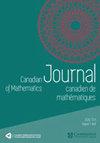二元无重叠词的一阶理论是可判定的
IF 0.7
3区 数学
Q3 MATHEMATICS
Canadian Journal of Mathematics-Journal Canadien De Mathematiques
Pub Date : 2023-05-26
DOI:10.4153/s0008414x23000342
引用次数: 0
摘要
摘要我们证明了二元无重叠词(更一般地说,对于有理的$\alpha $自由词$\alpha $, $2 < \alpha \leq 7/3$)的一阶逻辑理论是可判定的。因此,以前通过冗长的基于案例的证明获得的关于这类的许多结果现在可以使用决策过程“自动”证明,并且可以简单地通过将新的主张重述为逻辑公式来证明或证伪它们。本文章由计算机程序翻译,如有差异,请以英文原文为准。
The first-order theory of binary overlap-free words is decidable
Abstract We show that the first-order logical theory of the binary overlap-free words (and, more generally, the $\alpha $ -free words for rational $\alpha $ , $2 < \alpha \leq 7/3$ ), is decidable. As a consequence, many results previously obtained about this class through tedious case-based proofs can now be proved “automatically,” using a decision procedure, and new claims can be proved or disproved simply by restating them as logical formulas.
求助全文
通过发布文献求助,成功后即可免费获取论文全文。
去求助
来源期刊
CiteScore
1.80
自引率
0.00%
发文量
58
审稿时长
4.5 months
期刊介绍:
The Canadian Journal of Mathematics (CJM) publishes original, high-quality research papers in all branches of mathematics. The Journal is a flagship publication of the Canadian Mathematical Society and has been published continuously since 1949. New research papers are published continuously online and collated into print issues six times each year.
To be submitted to the Journal, papers should be at least 18 pages long and may be written in English or in French. Shorter papers should be submitted to the Canadian Mathematical Bulletin.
Le Journal canadien de mathématiques (JCM) publie des articles de recherche innovants de grande qualité dans toutes les branches des mathématiques. Publication phare de la Société mathématique du Canada, il est publié en continu depuis 1949. En ligne, la revue propose constamment de nouveaux articles de recherche, puis les réunit dans des numéros imprimés six fois par année.
Les textes présentés au JCM doivent compter au moins 18 pages et être rédigés en anglais ou en français. C’est le Bulletin canadien de mathématiques qui reçoit les articles plus courts.

 求助内容:
求助内容: 应助结果提醒方式:
应助结果提醒方式:


